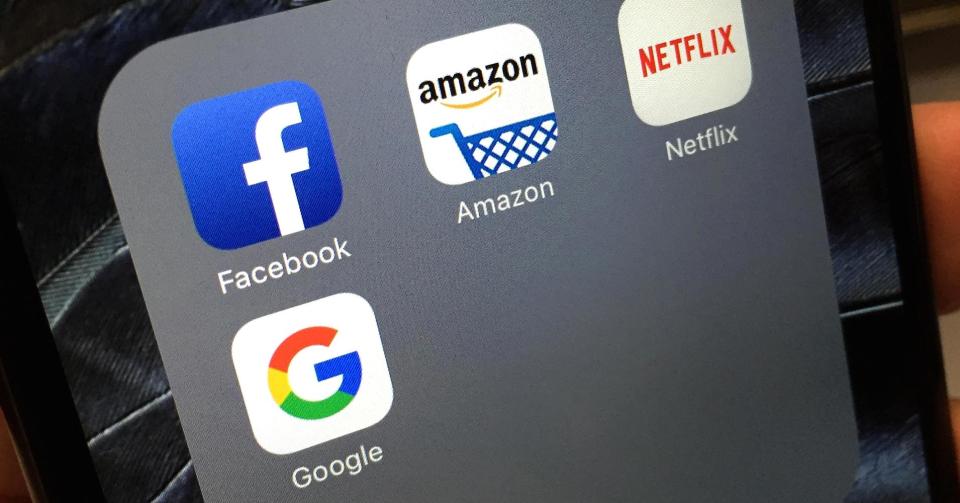FAANG stocks are still a good buy, but don't overlook Canada's DOCKS

Dizzying tailspins that recently wiped billions off the balance sheets of major U.S. technology companies should not sour investors on snapping up shares in industry-leading tech giants, according to a pair of analysts.
Several of the so-called FAANG stocks, a basket of five technology titans – Facebook, Apple, Amazon, Netflix, and Alphabet (Google) – have recently taken a drubbing as investors rebuffed a series of weaker-than-expected quarterly results.
The tech-heavy Nasdaq index crawled into positive territory on Tuesday following three straight sessions of sharp losses underpinned by tech and internet-related companies.
“Netflix kicked it off just over two weeks ago, missing on both domestic and international subscriber numbers. Facebook last Thursday as well. You throw on Twitter. You throw on Intel. It’s been a huge rotation,” said Joel Kulina, senior vice president of institutional cash equities at Wedbush.
Shares of both Facebook and Netflix have recently traded in bear-market territory, defined as a drop of at least 20 per cent from a recent high. Last Thursday, the California-based social media giant saw its biggest single-session loss in the company’s history. Roughly US$120 billion in market capitalization was erased in a matter of hours as investors grappled with the prospect of weaker growth on the horizon.
Meanwhile, Google’s parent company Alphabet recently topped earnings and revenue estimates, while Amazon delivered a hefty win on earnings, and a narrow miss on revenue for the second quarter. Apple also topped analysts’ expectations after the closing bell on Tuesday.
While the sheer scale of Facebook’s one-day loss surely sent a shockwave through the cohort of investors who for years have counted on the big U.S. internet and technology companies to deliver blockbuster growth, those willing to look south of the border for tech sector exposure may have the last laugh.
“I don’t think this is it, and the sector is going to be left for dead,” said Kulina. “You don’t sell Amazon or Google because Facebook is having issues regarding their platform. They missed on revenues, daily, monthly active users. Margins are guiding way down. Cash from operations fell short. Their guidance missed terribly. It’s some company specific issues.”
Ryan Modesto, chief executive of 5i Research, said while any perceived weakness regarding future growth for companies like Facebook are bound to be met with a swift market reaction, the revenues and cash flows they are generating are still “astronomical numbers at the end of the day.”
He adds that investors should consider the performance of the broader technology space, as opposed to reading too deeply into splashy headlines about Facebook and Netflix.
“Looking at the tech space this recent quarter, in aggregate, companies are still growing at double digit rates. Ninety per cent of the companies have beaten on earnings, and 83 per cent have beaten on revenues,” Modesto said.
“Maybe the growth rates of some of these companies are slowing,” he added. “But they are still some of the best growth rates in the market that you can find. We don’t see that as a reason not to own what are arguably some of the most dominant companies in the world.”
That optimism contrasts with a chorus of Wall Street researchers sounding the alarm with bearish calls on high-flying tech stocks. Morgan Stanley, Credit Suisse and Bank of America are among those warning of increased risk.
TIME TO FORGET ABOUT FAANG?
While the FAANG acronym has served as a convenient shorthand for U.S. internet and technology behemoths for several years now, some are now questioning it’s utility.
The performance of some of the five companies has decoupled significantly on a year-to-date basis, with Netflix shares surging about 68 per cent, versus Facebook’s roughly five per cent decline.
“I personally think the FAANG kind of acronym should probably be dismantled. Facebook and Google have massively underperformed the likes of Netflix and Amazon,” Kulina said.
He’s also anticipating a “shift in leadership” within the U.S. technology sector, with the likes of Microsoft, Adobe and Salesforce.com challenging the roster of FAANG stocks for dominance.
WHAT ABOUT CANADA’S TECH SECTOR?
Modesto recently coined Canada’s alternative to the FAANG stocks, dubbing Descartes Systems, Open Text, Constellation Software, Kinaxis and Shopify the “DOCKS.”
“With as much as we talk about the FAANGs, top-performing companies in Canada tend to get overlooked. Yet they have been posting sneaky-but-stellar performance over the last few years,” he wrote in a recent article published in The Globe and Mail.
That said, he remains convinced Canada’s comparably-nascent technology sector simply cannot compete with the sheer scale of its counterparts south of the border.
“I would definitely go on the U.S. side, just because the companies that you can choose from are just bigger. They have more cash. They have more scale. They have more market share,” Modesto said.
Darren Sissons, vice-president and partner at Campbell, Lee & Ross disagrees. He said U.S. dollar strength and waning potential for continued economic growth in that country are behind his preference for leading Canadian technology companies over more popular U.S. stocks.
“I would favour Canadian large-cap tech,” he said. “You never really make money buying the things that everyone else is buying. That’s a lesson that I see over and over again.”
Download the Yahoo Finance app, available for Apple and Android.

 Yahoo Finance
Yahoo Finance 
